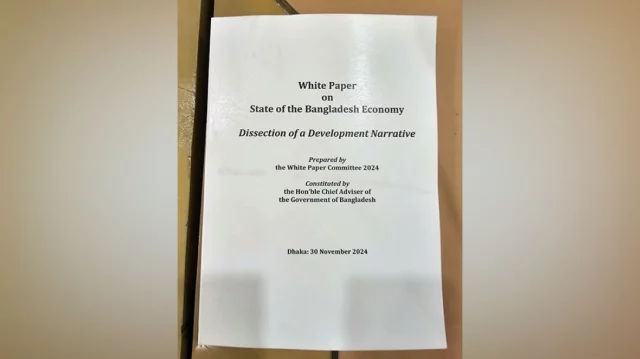
DHAKA, Dec 02, 2024 (BSS) – The White Paper report on the State of Bangladesh Economy “Dissection of a Development Narrative” has identified seven critical areas of immediate concern, which the interim government needs to address.
Head of the committee and Distinguished Fellow of the Centre for Policy Dialogue (CPD) Dr Debapriya Bhattacharya revealed the findings of the 399-page report at a press conference held at the NEC Conference Room in the city’s Sher-e-Bangla Nagar area today. Other Committee members were present.
These critical areas are: (i) Rolling out an economic stabilisation programme based on the experience of the first few months of the current regime (ii) Delineating a framework for the forthcoming national budget (2025-26) (iii) Proposal for a mid-term planning format (2025-27) guided by a robust evaluation of the now postponed 8th Five-Year Plan (2020-25).
The areas also include: (iv) Identifying Priority Reform Domains (v) Operationalising a robust transition strategy for LDC graduation (vi) Accelerating fuller delivery of the SDGs (vii) Hosting of a Forum for dialogue with development partners.
The report said the present White Paper exercise essentially validates the longstanding widespread concerns about the state of the economy. A closer look at the evidence on the ground reveals that the situation is much worse than was anticipated and apprehended earlier.
Addressing the emergent situation no doubt calls for a number of actions in the areas of macroeconomic stabilisation, policy changes and institutional reforms.
Speaking on the occasion, Dr Debapriya said they have prepared the White Paper going beyond the traditional process of research through an inclusive and consultative method.
He said although the draft report has been revealed, but the printed version of the report would be available within the next one and a half months after some editing.
The eminent economist alleged that over the last 15 years, the country transformed into a Kleptocratic legacy from Crony capitalism which was the result of three previous national elections, which had violated the basic democratic rights of people and demolished the space for accountability.
Highlighting the salient features of the report and the future actions of the government, the renowned economist said that the government should give a statement before the country’s people on the various operations and initiatives in different sectors.
Noting that the next six months would be ‘very important’ for the nation, he suggested the government to reveal its plan for economic management ahead of the next national budget.
Due to the reforms in the various sectors, Dr Debapriya also suggested the government to outline where the inflation, foreign currency reserves and interest rates would reach in a certain timeframe.
He also underscored the need for a mid-term plan specifying more the government’s efforts in the areas of investment, employment generation, education, healthcare services, and social safety nets.
Hailing the interim government’s decision for suspending the 8th Five Year Plan, he said that the projects of the plan were unimaginable, impractical, and there should be an authentic evaluation of the plan.
He also stressed on providing a statement on the last four months of the government’s operations, a working plan for the next six months and an outline of its operations for at least the next two years.
Regarding LDC graduation, Dr Debapriya said that Bangladesh is above in all the indexes for graduation while there is no such reason right now for withholding its efforts towards graduation slated for 2026.
He also urged all concerned to come out from the mindset of getting easy market access for an indefinite period.
Answering to a question, he said that Bangladesh is not a country for staying in the LDC group considering its capacity, qualifications and size.
When asked to rank the sectors where rampant corruption took place more over the last one and a half decades, he ranked the banking sector as the topmost one followed by infrastructures, energy and power and ICT.
Another distinguished fellow of CPD Prof Dr Mustafizur Rahman said that the next generation would have to bear the burden of the huge extent of corruption that took place in the mega projects over the years.
Dr Zahid Hussain, former lead economist of the World Bank, said that Bangladesh has already fallen in to the trap of middle income country while there are three ways to overcome such situation which are macroeconomic stability, policy reforms and ensuring institutional accountability.
Dr Selim Raihan, professor of Department of Economics, University of Dhaka, said that reforms should be carried out and continued in the important sectors and areas like economic recovery, private sector investment.
He also alleged that the last three general elections were largely flawed through which all the democratic institutions were destroyed.